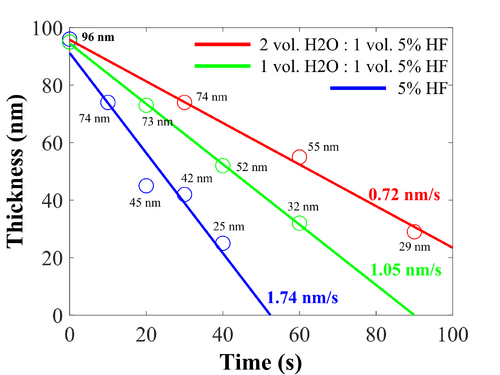Specific Process Knowledge/Etch/Aluminum Oxide/Al2O3 Etch using HF: Difference between revisions
| Line 8: | Line 8: | ||
=== Experiment and results === | === Experiment and results === | ||
Si samples with about 100 nm of ALD deposited Al<sub>2</sub>O<sub>3</sub> (1000 cycles at 300C) has been etched in different HF concentrations. After the etching, the thickness of the Al<sub>2</sub>O<sub>3</sub> layer has been measured, and the thickness as function of time has been plotted as shown in the graph below. | Si samples with about 100 nm of [[Specific_Process_Knowledge/Thin_film_deposition/ALD_Picosun_R200|ALD]] deposited Al<sub>2</sub>O<sub>3</sub> (1000 cycles at 300C) has been etched in different HF concentrations. After the etching, the thickness of the Al<sub>2</sub>O<sub>3</sub> layer has been measured, and the thickness as function of time has been plotted as shown in the graph below. | ||
Revision as of 09:47, 26 August 2019
Feedback to this page: click here
THIS PAGE IS UNDER CONSTRUCTION
A wet chemical etch of Al2O3 can be done with HF. The etch rate depends on the HF concentration.
Experiment and results
Si samples with about 100 nm of ALD deposited Al2O3 (1000 cycles at 300C) has been etched in different HF concentrations. After the etching, the thickness of the Al2O3 layer has been measured, and the thickness as function of time has been plotted as shown in the graph below.

Be aware of that the 5% HF etches quite fast - Actually so fast that it can be tricky to control the etch. Just imagine, you take a sample out of solution and place it in a bigger water container to rinse, and during that movement, the etch continues… So the handling things around the fumehood can be a source of errors.
Evgeniy Shkondin, DTU Nanolab, June 2019
